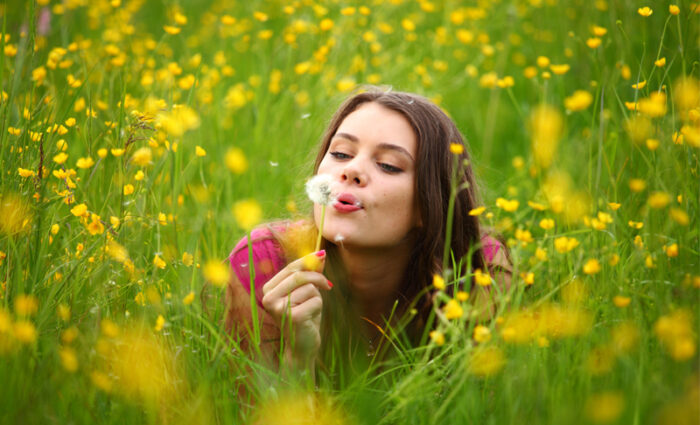Hay fever is here again

Spring has sprung!
It's lighter and sunnier - when it's not raining - and our landscapes are looking a little more alive. For some these signs also bring a feeling of dread.
As the blossoms bloom and bulbs come to life for many it is also the start of those familiar symptoms. The runny nose, itchy eyes and sneezing - all well-known signs of a pollen allergy also known as hay fever.
Top tips
In 2020 research found that 49% of people reported suffering from hay fever (Allergy UK). Therefore if you are reading this it is highly likely you or someone you care about struggles with the symptoms of hay fever. Here are our top tips to hopefully help.
- Be prepared
Treating hay fever starts with prevention. You can use treatments up to two weeks in advance so check pollen times and areas with local forecasts.
- Stay indoors
If you can, keep doors and windows closed, you'll find that your symptoms will ease inside so protect your inside space from pollen. When you return home take a bath or shower, wash your hair to remove pollen and change your clothes. You can also invest in air purifiers or air cleaners that help to remove any unwanted pollen that does sneak its way in.
- Use protection
When you do venture outside there are a few ways you can reduce your symptoms. If you're prone to itchy eyes you can use glasses - wrap-around ones which provide the most protection. Using petroleum jelly around (but not inside) your nostrils and eyes can help to trap pollen and wearing a face mask can protect you from breathing in pollen through your nose and mouth.
- Know the symptoms
Hay fever and other allergy symptoms overlap with Covid-19 so it's important to know the difference to help reduce the spread of the virus and protect those who are high risk. Doctors recommend testing for Covid-19 If you have:
More information on what to do if you think you have covid-19.
- Treat the symptoms
Many hay fever treatments come in various forms, it helps to be aware of which symptoms affect you the most. If you have itchy eyes you may find eye drops helpful, if your nose is blocked you might prefer a nasal spray over a tablet. An antihistamine that makes you drowsy could be really helpful if you’re having trouble sleeping. Our pharmacists can advise you on what options may work best for you and help put together a treatment plan.
- Talk to your pharmacist
Our pharmacists can help you with advice, treatment options, and any questions you may have about your hay fever.
Find your local pharmacy.

Fact or fiction quiz
How much do you really know about this common allergy and what causes it? We have assembled some information below, see if you can determine the facts from the fiction.
Question 1
Only flowers cause hay fever - true or false?
False
Trees, grass and weeds also produce pollen. Some people can also be allergic to
mushroom spores causing similar symptoms.
Question 2
Pets
can get hay fever too - true or false?
True
Just like us cats and dogs can also get hay fever.
Question 3
Hay
fever symptoms only affect people during the day - true or false?
False
Symptoms can occur 24 hours a day 7 days a week. Both day and night.
Find out more about what to do if hay fever is worse at night time.
Question 4
Hay
fever only affects people during the summer - true or false?
False
Hay fever can affect people year round however it is most common between March and September.
Question 5
Alcohol
can make hay fever worse - true or false?
True
Beer, wine and other spirits contain histamine - the chemical that sets off
allergy symptoms in the body.
Find out more about foods that may make you hay fever worse.
Question 6
Heat
waves make hay fever worse - true or false?
False
There are optimal temperatures for pollen to be released, if the temperature
rises above 28°C all pollen levels decrease. If this continues over a number of
days plants' supply of pollen can run out altogether.
Question 7
Hay
fever isn't as bad in urban areas - true or false?
False
Urban areas tend to have lower pollen counts than the countryside, but pollen
combined with air pollution in the city centre can worsen hay fever and asthma
symptoms.
Read more about the University of Manchester's research on hay fever in urban areas.
Question 8
There
is a correlation between pollen levels and anxiety - true & false?
True
According to the International Journal of Child Health and Human Development, they have found that high pollen levels can affect anxiety levels in people with
recurrent mood disorders, such as bipolar.
Question 9
Pollen
may hold the key to plant conservation - true or false?
True
Palynologists (those who scientifically study plant pollen and spores) are hoping to
discover the best long term storage methods for pollen to help conserve the
biodiversity of wild plant species, especially plants whose seeds cannot be
stored.
Question 10
Pollen
helps us fight crime - true or false?
True
Forensic Palynology is often used to help solve crimes. Pollen is so resilient, it can often stick to objects even after being washed. By studying pollen found we can determine where the pollen originated, this can help with tracking suspects and much more.
Here to help
Our pharmacists are here to help with any hay fever concerns you may have. They can suggest treatments that may work better for you and help put together a treatment plan.
